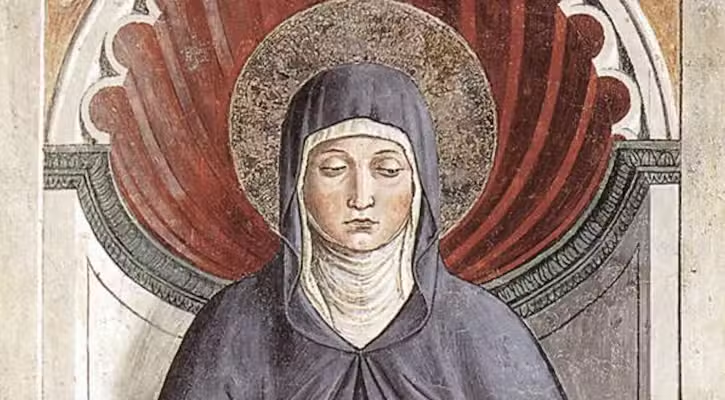Monica (or, spelled more accurately, Monnica) was born in 332 in the North African city of Thagaste in what is now Algeria. Most of what we know of her we learn from her son, Augustine, who gives ample space to her life in his classic work, Confessions.
Educated by a household servant, Monica cared for her father and siblings until she married Patricius, a pagan landowner and minor Roman official of the same town. Patricius seems to have been an arrogant man who was not always faithful to his wife but, as Augustine says, unlike other husbands of the time, never beat her, despite his volatile temper.
Patricius was unhappy that his wife raised Augustine as a Christian but, as an ambitious father, invested in his son’s education. Before his early death, Patricius was baptized due to the good example of his wife. She was a widow at 40.
Monica’s Famous Son
Monica was 23 when Augustine was born (she had another son and a daughter). She doted on him though she was unhappy with his lifestyle and lack of maturity. When Augustine left for Rome after his studies in Carthage (without telling his mother, who was quite wounded by his secret departure), she followed him and lived in his household.
Augustine praised her deep piety and prayerful life. After Augustine was baptized by St. Ambrose in Milan, Monica and her son lived a quiet life in nearby Cassiciacum where she figures as one of the characters in her son’s dialogues On the Blessed Life (De Vita Beata) and On Order (De Ordine).
At this time, Augustine decided never to marry formally, which freed Monica from the onerous task of finding him a suitable bride. She was quite close to Augustine’s son, Adeodatus (“gift from God”), born to him from a common-law marriage.
While waiting at the port of Ostia—near Rome—for a ship to Africa, she and her son had a conversation which Augustine famously describes in Book IX of the Confessions. This exchange between mother and son about the ascent to God was done in a fashion that some have described as mystical.
Before their ship departed, Monica became sick and died in the year 387 at the age of 55. She was buried in Ostia. In 1945, a fragment of an inscription from her gravesite was discovered.
In the 15th century, her remains were reburied in the Church of Sant’Agostino in Rome, where she is venerated today. Her feast is observed, fittingly enough, a day before the feast of her son, Augustine, on August 28.
Mother/Muse
In the closing part of Book IX of the Confessions, Augustine has a moving tribute to both mother and father in a text where, for the first and only time, he uses his mother’s name.
Monica told her son that the only thing she wanted from life was to see her son “a Catholic and a child of heaven.” She had seen him through his tumultuous adolescence, his flirtation with the religion of the Manichees, his irregular sexual life and his long search to find the faith which she had never doubted.
Historical Background
Monica was a North African. Her very name echoes the paganism that had once been part of Numidian history, since Mon was a Libyan god. Quite likely, Monica was of Berber origin although she was a Christian from birth. Her son Navigius was with her in her last illness and her daughter Perpetua (named for the great Carthaginian martyr) was head of a monastery near Augustine’s own church in Hippo. Navigius’s son, Monica’s grandson, was a deacon in the North African Church.
That ancient land was thoroughly Christian in the fourth century and its rich agricultural output made it the breadbasket of Rome. Monica and Augustine were Africans who belonged to a Christian church which not only produced powerful theologians like Tertullian and Augustine himself but also great martyrs like Cyprian of Carthage and Sts. Perpetua and Felicity. It is crucial to keep those facts in mind to counteract the impression that white Europeans had a monopoly on Christianity.



2 thoughts on “A Celebration of St. Monica”
Thank you, feeling Blessed~
My name is Monique, my parents named me after St. Monica. I’m French Canadian decent. I found out St. Monica is also the patron saint of abused women. I went through abuse with my now ex husband. My two children were my focal point in life when they were younger and still are. I wanted more in life for them and me that’s why I left. I had a job with the school district so I could be home for them. My daughter is special needs. Everything I’ve done is for them. I had them both baptized when they were younger. I’ve gotten so many compliments about them that they are both good beautiful kids. St. Monica has been an inspiration for me and I’m glad to share her namesake.